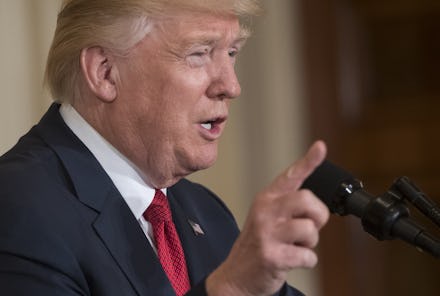Press associations are pushing back after Donald Trump's Twitter threats

President Donald Trump's Friday threat to scratch the White House daily press briefing had skeptics calling it just another attempt to distract the media.
Navel-gazing reporters, some social media pundits said, would rush to make the headlines about a threat to their own work. That would give Trump a break from a barrage of stories about his firing of FBI Director James Comey amid an investigation of whether Russia tampered with the 2016 election.
"This is Trump's only trick: Throw something crazy out that gets the press to focus on how it impacts them instead of the scandal du jour," tweeted Dan Pfeiffer, a former top adviser to then-President Barack Obama.
Actual threat or merely hot air, professional journalism associations took the president's remark seriously all the same.
"White House briefings and press conferences provide substantive and symbolic opportunities for journalists to pose questions to officials at the highest levels of the U.S. government," Jeff Mason, president of the White House Correspondents' Association, said in an email. "That exercise, conducted in full view of our republic's citizens, is clearly in line with the spirit of the First Amendment."
"Doing away with briefings would reduce accountability, transparency and the opportunity for Americans to see that, in the U.S. system, no political figure is above being questioned," Mason wrote in a tweet.
The PEN American Center, a free press and human rights group, acknowledged in a statement that the commander-in-chief could just be blowing smoke about cutting off contact with an aggressive press.
"Even if it's idle bluster aimed to distract attention amid a tough news cycle, the president's threat to end daily White House press briefings evinces his abject disregard for the role of the press and rudiments of our democracy," executive director Suzanne Nossel said in a statement.
"Recent events have cast a grave pall over the public's ability to trust in government," Nossel said. "Restoring that trust, a bedrock of democracy, depends on transparent, accurate flow of information to inform public discourse. The press is an indispensable conduit for that."
Ultimately, Lynn Walsh, president of the Society of Professional Journalists, said in an email, "The real loser in all of this is the American people."
Walsh continued:
The press briefings allow for an opportunity for the public (via journalists and news organizations) to receive updates on what the president and White House, leaders paid for with public money, are doing. Yes, they can use social media and the internet, but not everyone looks to those platforms for information. In addition, without holding a briefing the possibility of asking questions and receiving answers in a timely manner is eliminated.
On Wednesday, U.S. media was shut out of Trump's meeting with Russian foreign minister Sergey Lavrov while a Russian state media photographer got in.
Reporters have also tried to unwind a cascade of conflicting reports about Trump's decision to fire Comey — and the greater implications of that move.
For Trump, who benefited vastly from the attention of the press in his unlikely rise to the White House even while castigating members of the "fake media" for its coverage, Friday may have been just another day on Twitter.
For the political press? Just another day on the job.
Later Friday, Fox News released excerpts of a Trump sit-down with host Jeanine Pirro in which the president defended White House Press Secretary Sean Spicer and his deputy, Sarah Huckabee Sanders, for facing "a level of hostility that's incredible" and "very unfair."
In the interview, which airs Saturday, Trump tells Pirro abandoning the daily briefings is an option.
"You don't mean that," responds Pirro, host of Justice With Judge Jeanine.
"Well, just don't have them. Unless I have them every two weeks and I do them myself, we don't have them," Trump says. "I think it's a good idea."
May 12, 2017, 4:03 p.m.: This story has been updated.